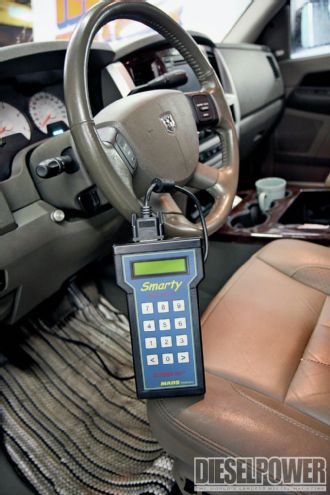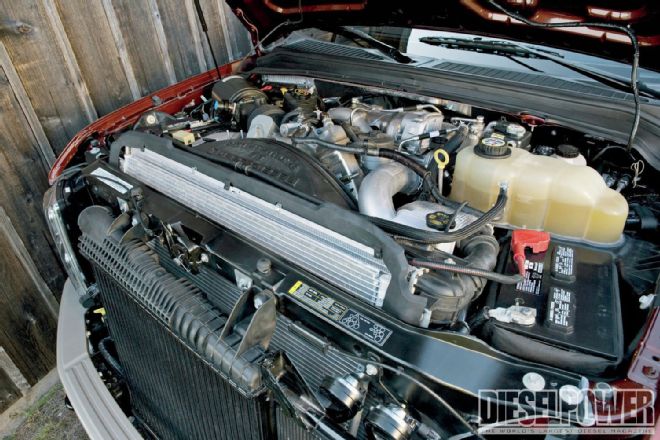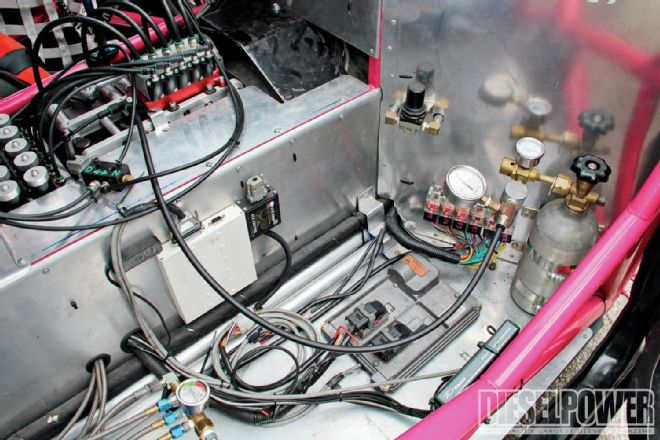Welcome to Top Tech Questions. Oftentimes, readers contact us with questions about articles, or to praise us on what a good job we are doing. But our favorite form of reader communication is tech questions. Our Top Tech section is a place where you ask what’s on your mind, and we answer it. Got a trouble code? Wondering how to get your engine to make more power? Send us an email at
[email protected] we’ll do our best to answer it.

| For those with ’03 to ’05 Dodges wanting custom tuning, MADS Electronics offers a UDC option for its Smarty programmers, which allows end users to build programs specific to their custom setups.
UDC vs. EFI
Question: In the January 2014 issue, you stated Banean Woosley used EFILive, and I was wondering how that was possible. If his truck was an ’05, then he most likely used the Smarty UDC.
James Stratis
Franklin, Indiana
Answer: That one was our error; Banean was indeed using the Smarty UDC to tune his truck, which can be used to adjust the various parameters of the computer system, much like EFILive. We mistakenly assumed Banean had an EFILive conversion by Reiff Diesel, a company that for $2,500 makes a harness that adds an ECU and makes ’03 to ’05 trucks compatible with EFILive tuning (normally available on ’06 to ’09 Rams). However, we must be a little psychic, as Banean has since informed us that he is looking into an EFILive conversion for ultimate tweakability.

| The factory compound turbos found on ’08 to ’10 Ford F-250s and 350s have awesome power potential and, with upgraded compressor wheels, can make more than 600 rwhp with proper fueling.
Single vs. Compounds
Question: I was wondering why Ford decided to ditch the compound turbochargers after the 6.4L model engine. It seems like a step backward to revert to a single turbo, considering many people in the aftermarket switch to compound turbos for more power and better towing.
John Newberry
Gilbert, Arizona
Answer: Well, it all depends on how you look at things when talking about the single turbo vs. compound-turbo debate. Compound turbos do lend themselves to making more power out of the box, which is why ’08 to ’10 Fords have the highest tuner-only horsepower potential of any of the electronically controlled trucks. With a hot tune and stock compound turbos, 550 to 570 rwhp (approaching 700 at the flywheel) is not out of the question.
Factory engineers don’t live in a world of 700 hp, however—they live in a world of roughly 400 hp. And for that power level, a single turbo has its advantages. Compounds are more costly, harder to package, and more prone to boost or exhaust leaks. In the 30- to 40-psi range, a single turbo can still be efficient, is cheaper, and will spool nearly as quick as compound turbos. However, the horsepower potential is definitely lower, as evidenced by the 400 to 500 rwhp levels we’re seeing on newer factory trucks on hot tunes. For the OEM, the ability to meet emissions thanks to variable-geometry technology, cost savings, and the simplicity of a single turbo is often what seals the deal.

| At last year’s NHRDA World Finals, we caught a glimpse of the ECU Shop piggyback setup on the team’s drag truck. Capable of adjusting rail pressure, timing, and fueling, this particular unit was built for the 3.0L, four-cylinder Isuzu Dmax engine.
Standalone vs. Standalone
Question: I am Italian, and I have a 1.9L Fiat engine, but I am having problems with the original ECU because the engine stops at 5,200 rpm and I cannot go further. I know there is a Bosch Motorsport control unit. Will that help solve my problem?
Filippo Rapisarda
via email
Answer: We had to use Google Translate for this one (it was emailed in Italian), so please excuse us if the grammar isn’t the best. From the sound of it, you have an electronically controlled 1.9L diesel that you need to exceed 5,200 rpm. First of all, we’ve seen many diesels (even the smaller ones) make good power at less than 5,000 rpm. In fact, the 2.2L Mazda racing diesel makes 450 hp and is shifted at 4,900 rpm. Let’s say for the sake of argument, though, that you do need to exceed that engine speed, and to accomplish that there are a few different choices.
The first choice is the Bosch controller you mentioned, which is also usually accompanied by its lines and injectors. While the Bosch controllers work extremely well as a standalone unit (and can run virtually any rpm you’d want), they are very expensive -- somewhere in the range of $10,000 to $15,000 for a complete setup. Another option is to run the Zeus standalone controller from Destroked.com, which can be made to work with a four-cylinder diesel for around $5,000 (minus the injectors, rails, and so on).
A final option is a piggyback ECU that’s made to work with the factory computer. We saw this setup on a 7-second drag truck from Thailand, and it worked very well. ECU Shop (in Thailand) makes these types of computers for various makes and models, although the language barrier may be somewhat difficult to breach, and there’s no guarantee they make one for your specific application.
“We had to use Google Translate for this one (it was emailed in Italian), so please excuse us if the grammar isn’t the best.”
 | For those with ’03 to ’05 Dodges wanting custom tuning, MADS Electronics offers a UDC option for its Smarty programmers, which allows end users to build programs specific to their custom setups.
UDC vs. EFI
Question: In the January 2014 issue, you stated Banean Woosley used EFILive, and I was wondering how that was possible. If his truck was an ’05, then he most likely used the Smarty UDC.
James Stratis
| For those with ’03 to ’05 Dodges wanting custom tuning, MADS Electronics offers a UDC option for its Smarty programmers, which allows end users to build programs specific to their custom setups.
UDC vs. EFI
Question: In the January 2014 issue, you stated Banean Woosley used EFILive, and I was wondering how that was possible. If his truck was an ’05, then he most likely used the Smarty UDC.
James Stratis | The factory compound turbos found on ’08 to ’10 Ford F-250s and 350s have awesome power potential and, with upgraded compressor wheels, can make more than 600 rwhp with proper fueling.
Single vs. Compounds
Question: I was wondering why Ford decided to ditch the compound turbochargers after the 6.4L model engine. It seems like a step backward to revert to a single turbo, considering many people in the aftermarket switch to compound turbos for more power and better towing.
John Newberry
| The factory compound turbos found on ’08 to ’10 Ford F-250s and 350s have awesome power potential and, with upgraded compressor wheels, can make more than 600 rwhp with proper fueling.
Single vs. Compounds
Question: I was wondering why Ford decided to ditch the compound turbochargers after the 6.4L model engine. It seems like a step backward to revert to a single turbo, considering many people in the aftermarket switch to compound turbos for more power and better towing.
John Newberry | At last year’s NHRDA World Finals, we caught a glimpse of the ECU Shop piggyback setup on the team’s drag truck. Capable of adjusting rail pressure, timing, and fueling, this particular unit was built for the 3.0L, four-cylinder Isuzu Dmax engine.
Standalone vs. Standalone
Question: I am Italian, and I have a 1.9L Fiat engine, but I am having problems with the original ECU because the engine stops at 5,200 rpm and I cannot go further. I know there is a Bosch Motorsport control unit. Will that help solve my problem?
Filippo Rapisarda
| At last year’s NHRDA World Finals, we caught a glimpse of the ECU Shop piggyback setup on the team’s drag truck. Capable of adjusting rail pressure, timing, and fueling, this particular unit was built for the 3.0L, four-cylinder Isuzu Dmax engine.
Standalone vs. Standalone
Question: I am Italian, and I have a 1.9L Fiat engine, but I am having problems with the original ECU because the engine stops at 5,200 rpm and I cannot go further. I know there is a Bosch Motorsport control unit. Will that help solve my problem?
Filippo Rapisarda